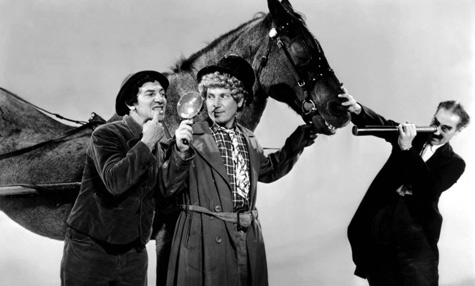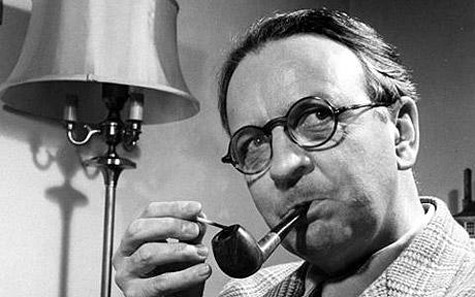
Being the child of intellectual Jews gave me many advantages as a kid (bagels, Woody Allen movies, skepticism of political power), but when we moved to suburban Long Island in the late 1960s, I discovered the downside. First, none of the local barbers knew what to do with my frizzy “ethnic” hair (they tried to plaster it down with something resembling industrial shellack), and second, most of my schoolmates never seemed to question the existing order of things, like mandatory attendance at pep rallies, which struck me as somewhat fascistic back in 7th grade. My views were unappreciated by the dominant jock culture, but I was able to survive by making the big guys laugh.
I first discovered the Marx Brothers in Duck Soup, which was especially popular during the Vietnam War era because of its perceived satirical stance against authoritarianism and war. Groucho’s omnidirectional mudslinging, and especially his old vaudevillian’s trick of pointing out the absurdities of a given situation by speaking directly to the audience gave me a blueprint for navigating the treacherous pathways of adolescent identity. (Full disclosure: I played Groucho twice in elementary and junior high school adaptations of Duck Soup and A Night at the Opera.)
By 9th grade, I had memorized most of the dialogue of the Marx Brothers’ first ten films, and was looking for another source of irreverence.
I found it in Raymond Chandler’s Philip Marlowe.
I was already a fan of mysteries, having progressed from the Boxcar Children and Basil of Baker Street (the source of Disney’s The Great Mouse Detective) to the tales of Poe and Doyle’s complete cycle of Sherlock Holmes stories.
But this Marlowe guy was different. As tough and hard-boiled as he was, he reminded me a little of Groucho, tossing out irreverent comments about all that is pompous and false—except he wasn’t going up against the harmless farcical gangsters of Monkey Business, he was going up against hardened killers in a city that was thoroughly and hopelessly corrupt. (This was during the Watergate era, which probably helped.)

“What are you going to be when you grow up—a five-foot shelf?”
“He’s so tight his head squeaks when he takes his hat off.”
“You bumped anybody off tonight?”
“I’d have to look at my notebook.”“I never had a forty-five. A guy who needs that much gun ought to use a pick.”
He reached quietly under my coat and took the Luger. I might as well leave it home from now on. Everybody in town seemed to be able to take it away from me.
Needless to say, I could hear echoes of a closet Grouchophile behind the scenes of these hard-boiled dramas. And while Marlowe never pulled a live turkey from under his trench coat (as Harpo does in Room Service), he did wear a trench coat and was very quick with the wisecracks.
So, back to the theme: Humor is the weapon of the powerless.
Although Groucho occasionally played the president of a college or a rather screwy country, he usually portrayed an impoverished charlatan of some sort—a stowaway, an opera impresario with no clients, a horse doctor trying to pass as a respected physician, a theatrical agent with no backers, the manager of a failing hotel who lampoons the very idea of the American Dream when he says:
“Think of the opportunities here in Florida. Three years ago I came to Florida without a nickel in my pocket. Now I’ve got a nickel in my pocket.”
Marlowe is equally cynical about the promises of the so-called land of opportunity, and usually finds himself outranked, outnumbered, and outgunned by big time crooks and “legitimate” businessmen who make way more than his lousy 25 bucks a day plus expenses. He has virtually no political, social, or economic power, but he makes up for that with boatloads of attitude and smartass humor.
Attitude. That’s what got me through the tough times, and this same quality can be found in my favorite crime writers. For what is the figure of the private investigator if not the ultimate outsider? The ultimate charlatan, pretending to bring order to a world that refuses order like an old school vampire doing his Oh-no-a-cross thing? (Ah! It burns!)
Despite their apparent differences (including the little-known fact that only one of them was a genuine flesh-and-blood human being), these two mid-20th century figures were crucial to my formation as a fan of the genre.
Ken Wishnia is an associate professor of English at Suffolk Community College. He is the author of Blood Lake, The Fifth Servant, The Glass Factory, Red House, Soft Money, and the Edgar-nominated 23 Shades of Black. He lives in New York City.
Read all posts by Kenneth Wishnia for Criminal Element.

What a great post–thanks. I too used humor to gain acceptance in high school, not because I was Jewish, but because I wanted to be liked. When I got to college, many people assumed I was Jewish, especially Jewish students. But humor isn’t just a weapon of the powerless: “People told me I should have my presidential library built where I was born, but explained I wanted it in the United States.” Rim shot, please, for POTUS.